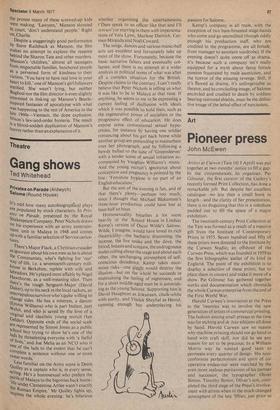The atre
Gang shows
Ted Whitehead
Privates on Parade (AI dwyc h ) Salome (Round House)
it's odd how many autobiographical plays are Populated by stock characters. in Privates on Parade, presented by the Royal Shakespeare Company, Peter Nichols draws 011 his experience with an army entertainment unit in Malaya in 1948 and conies 1-113 with a familiar selection of Service caricatures.
There's Major Flack, a Christian crusader as ignorant about his own men as he is about the Communists, who's fighting for 'our' Way of life, i.e. a seventeenth-century millhouse in Berkshire, replete with wife and labradors. He's played most affably by Nigel Hawthorne, as a well-meaning idiot. Then there's the tough Sergeant-Major (David baker), up to his neck in the local rackets, an unscrupuloussurvivor who'squite willing to Change sides. He has a mistress, a dancer Errima Williams) who is part Indian, part Welsh, and who is saved by the love of a virginal and idealistic young recruit (Ian Gelder). Opposite ends of the social scale are represented by Simon Jones as a public hool boy trying to show he's one of the lads by threatening everyone with 'a fistful of fives,' and Joe Melia as an NCO who is °Tle of the lads to the extent that he can't complete a sentence without one or more swear words. Less familiar on the Army scene is Denis QuilleY as a captain who is, in every sense, 'acting. He's a homosexual who prefers the Perils
of Malaya to the bigotries back home:
‘nle under Clement ma Attlee wasn't exactly the Roman Empire.' Mr Quilley lights up, InsPires the whole evening: he's hilarious whether organising the entertainments Mare speak to an officer like that and I'll scream')or starring in them with impersonations of Vera Lynn, Marlene Dietrich, Carmen Miranda and Noel Coward.
The songs, dances and various music-hall acts are excellent and fortunately take up most of the show. Fortunately, because the basic narrative falters and eventually collapses, and there is no attempt at a wider analysis in political terms of what was after all a complex situation for the British. Despite claims to the contrary, I can't really believe that Peter Nichols is telling us what it was like to be in Malaya at that time. If anything, he seems to me to be expressing a current feeling of disillusion with ideals which it was possible to hold then, such as the regenerative power of socialism or the progressive effect of education. He does expose some conventional sexual hypocrisies, for instance by having one soldier romancing about his girl back home while another group are pretending to masturbate over her photograph, and by following a bawdy ballad to the tune of 'Greensleeves' with a tender scene of sexual initiation accompanied by Vaughan Williams's music. And the young recruit's ignorance about conception and pregnancy is pointed by the line: 'Feminine hygiene is no part of an English education.'
But the aim of the evening is fun, and of that there's plenty—perhaps too much, since I thought that Michael Blakemore's three-hour production could have lost at least half an hour.
Homosexuality breathes a lot more heavily at the Round House in Lindsay Kemp's version of Oscar Wilde's Salome. Wilde, I imagine, would have loved its rich theatricality—the barbaric drumming, the incense, the live snake and the dove, the blood, breasts and screams, the androgynous males coiling about the stage and about each other, the unchanging atmosphere of selfconscious decadence. Kemp takes enormous risks—one giggle would destroy the illusion—but on the whole he succeeds in maintaining the feeling of nightmare, and for a short middle-aged man he is astonishing as the young Salome. Supporting him is David Haughton as Jokanaan, chalk-white with purity, and Vladek Sheybal as Herod, cunning enough but underplaying his
passion for Salome.
Kemp's company is all male, with the exception of two bare-breasted stage-hands who come and go uncredited (though oddly enough his production staff, who are credited in the programme, are all female, from manager to assistant wardrobe). If the evening doesn't quite come off as drama, it's because such a company isn't really equipped for a myth about fierce female passion frustrated by male asceticism, and the horror of the ensuing revenge. Still, if it's flawed as drama, it's unforgettable as theatre, and its concluding image, of Salome encircled and crushed to death by soldiers bearing mirrored shields, must be the definitive image of the lethal effect of narcissism.


































 Previous page
Previous page